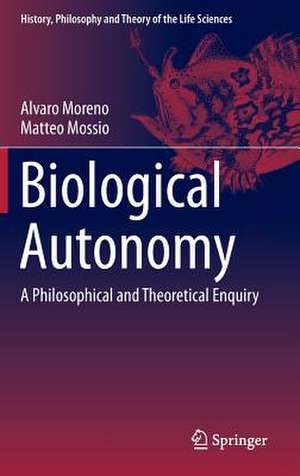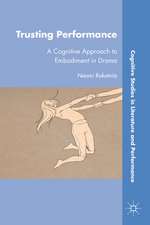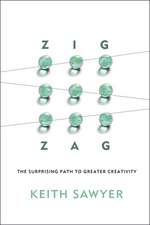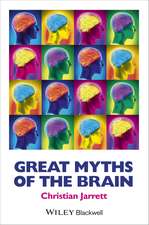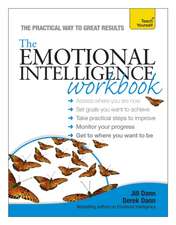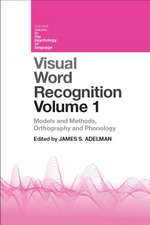Biological Autonomy: A Philosophical and Theoretical Enquiry: History, Philosophy and Theory of the Life Sciences, cartea 12
Autor Alvaro Moreno, Matteo Mossioen Limba Engleză Hardback – 19 mai 2015
Topics covered in this book include organisation and biological emergence, organisms, agency, levels of autonomy, cognition, and a look at the historical dimension of autonomy. The current development of scientific investigations on autonomous organisation calls for a theoretical and philosophical analysis. This can contribute to the elaboration of an original understanding of life - including human life - on Earth, opening new perspectives and enabling fecund interactions with other existing theories and approaches. This book takes up the challenge.
| Toate formatele și edițiile | Preț | Express |
|---|---|---|
| Paperback (1) | 694.87 lei 6-8 săpt. | |
| SPRINGER NETHERLANDS – 23 oct 2016 | 694.87 lei 6-8 săpt. | |
| Hardback (1) | 701.06 lei 6-8 săpt. | |
| SPRINGER NETHERLANDS – 19 mai 2015 | 701.06 lei 6-8 săpt. |
Din seria History, Philosophy and Theory of the Life Sciences
- 15%
 Preț: 642.83 lei
Preț: 642.83 lei - 18%
 Preț: 735.84 lei
Preț: 735.84 lei - 15%
 Preț: 644.95 lei
Preț: 644.95 lei - 9%
 Preț: 627.82 lei
Preț: 627.82 lei -
 Preț: 349.63 lei
Preț: 349.63 lei - 18%
 Preț: 1240.76 lei
Preț: 1240.76 lei - 18%
 Preț: 785.55 lei
Preț: 785.55 lei -
 Preț: 398.63 lei
Preț: 398.63 lei -
 Preț: 389.11 lei
Preț: 389.11 lei - 15%
 Preț: 651.02 lei
Preț: 651.02 lei -
 Preț: 391.22 lei
Preț: 391.22 lei - 15%
 Preț: 646.43 lei
Preț: 646.43 lei - 24%
 Preț: 590.18 lei
Preț: 590.18 lei - 15%
 Preț: 644.49 lei
Preț: 644.49 lei - 18%
 Preț: 1120.05 lei
Preț: 1120.05 lei - 15%
 Preț: 583.78 lei
Preț: 583.78 lei - 5%
 Preț: 1103.39 lei
Preț: 1103.39 lei -
 Preț: 438.69 lei
Preț: 438.69 lei - 15%
 Preț: 693.57 lei
Preț: 693.57 lei - 15%
 Preț: 638.57 lei
Preț: 638.57 lei - 5%
 Preț: 906.63 lei
Preț: 906.63 lei - 15%
 Preț: 692.09 lei
Preț: 692.09 lei -
 Preț: 353.99 lei
Preț: 353.99 lei - 18%
 Preț: 949.23 lei
Preț: 949.23 lei - 18%
 Preț: 735.21 lei
Preț: 735.21 lei - 18%
 Preț: 725.75 lei
Preț: 725.75 lei - 18%
 Preț: 792.19 lei
Preț: 792.19 lei -
 Preț: 357.63 lei
Preț: 357.63 lei - 24%
 Preț: 713.96 lei
Preț: 713.96 lei -
 Preț: 354.38 lei
Preț: 354.38 lei
Preț: 701.06 lei
Preț vechi: 824.79 lei
-15% Nou
Puncte Express: 1052
Preț estimativ în valută:
134.14€ • 140.07$ • 110.77£
134.14€ • 140.07$ • 110.77£
Carte tipărită la comandă
Livrare economică 15-29 aprilie
Preluare comenzi: 021 569.72.76
Specificații
ISBN-13: 9789401798365
ISBN-10: 9401798362
Pagini: 200
Ilustrații: XXXIV, 221 p. 19 illus.
Dimensiuni: 155 x 235 x 20 mm
Greutate: 0.54 kg
Ediția:2015
Editura: SPRINGER NETHERLANDS
Colecția Springer
Seria History, Philosophy and Theory of the Life Sciences
Locul publicării:Dordrecht, Netherlands
ISBN-10: 9401798362
Pagini: 200
Ilustrații: XXXIV, 221 p. 19 illus.
Dimensiuni: 155 x 235 x 20 mm
Greutate: 0.54 kg
Ediția:2015
Editura: SPRINGER NETHERLANDS
Colecția Springer
Seria History, Philosophy and Theory of the Life Sciences
Locul publicării:Dordrecht, Netherlands
Public țintă
ResearchCuprins
Introduction: Life as autonomy.- I. Constraints and organisational closure.- II. Biological emergence and inter-levels causation.- III. Teleology, normativity, and functionality.- IV. Agency.- V. Evolution: the historical dimension of autonomy.- VI. Organisms and levels of autonomy.- VII. Cognition.- VIII. Opening conclusions.- Index.
Recenzii
“This volume provides a comprehensive overview ofissues in the philosophy of biology and how these relate to current concerns oftheoretical biology. … book allows a reader interested in understanding thecurrent status of philosophy of biology access to the key issues andcontributors as well as the case for the particular approach advocated byMoreno and Massio. … Biological Autonomy could be an effective resource inupper-division courses and graduate seminars on philosophy of biology and/ortheoretical biology.” (Bruce H. Weber, Science & Education, November, 2015)
Textul de pe ultima copertă
Since Darwin, Biology has been framed on the idea of evolution by natural selection, which has profoundly influenced the scientific and philosophical comprehension of biological phenomena and of our place in Nature. This book argues that contemporary biology should progress towards and revolve around an even more fundamental idea, that of autonomy. Biological autonomy describes living organisms as organised systems, which are able to self-produce and self-maintain as integrated entities, to establish their own goals and norms, and to promote the conditions of their existence through their interactions with the environment.
Topics covered in this book include organisation and biological emergence, organisms, agency, levels of autonomy, cognition, and a look at the historical dimension of autonomy. The current development of scientific investigations on autonomous organisation calls for a theoretical and philosophical analysis. This can contribute to the elaboration of an original understanding of life - including human life - on Earth, opening new perspectives and enabling fecund interactions with other existing theories and approaches. This book takes up the challenge.
Topics covered in this book include organisation and biological emergence, organisms, agency, levels of autonomy, cognition, and a look at the historical dimension of autonomy. The current development of scientific investigations on autonomous organisation calls for a theoretical and philosophical analysis. This can contribute to the elaboration of an original understanding of life - including human life - on Earth, opening new perspectives and enabling fecund interactions with other existing theories and approaches. This book takes up the challenge.
Caracteristici
Comprehensive overview of the philosophical and theoretical debate on the idea of biological autonomy, and its relations with cognitive skills Integrated framework for the theory of biological autonomy, that opens up new perspectives for the understanding of biological phenomena Enabling a full interaction with existing theories and approaches Clearly structured overview of the constitutive, interactive and historical dimension of autonomy
